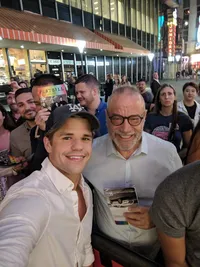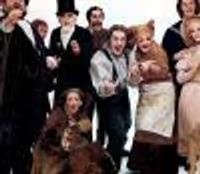Best Cast of a movie musical ever, what's your favorite?
Jarethan
Broadway Legend Joined: 2/10/11
#50Best Cast of a movie musical ever, what's your favorite?
Posted: 7/8/20 at 3:45pm
DigificWriter said: "Three that haven't been mentioned yet:
* Sweeney Todd
* Les Miserables
* The Greatest Showman
I assume you are being sarcastic. Les Miserable has a mostly excellent cast, with one exception, Russell Crowe in the second largest role; but that exception is so glaring that it would eliminate the movie from any consideration in my mind.
I honestly can not even remember who was in the movie of Sweeney Todd, other than the two leads and Sacha Baron Cohen. Bonham Carter received some very bad reviews, mainly because of her extremely thin singing voice. The people who played Anthony, Joanna, and Tobias were all forgettable, also.
IMOThe Greatest Showman is such a rotten movie -- I didn't realize a movie needed so many power ballads -- that it would never cross my mind. Thinking about it, there was nothing special, again IMO, about anyone in the cast (fine, Keala Settle sang the hell out of her power song), other than Hugh Jackman's charisma.
DigificWriter
Leading Actor Joined: 1/23/12
#51Best Cast of a movie musical ever, what's your favorite?
Posted: 7/8/20 at 4:12pm
Jarethan said: "
I assume you are being sarcastic.
"
You assume incorrectly.
You're free to disagree, but I genuinely consider the casts of Les Mis, Sweeney Todd, and The Greatest Showman to be excellent.
And, yes, that assessment includes Russell Crowe's casting as Javert, as I find nothing wrong with his interpretation of the role.
#52Best Cast of a movie musical ever, what's your favorite?
Posted: 7/8/20 at 4:18pm
DigificWriter said: "Jarethan said: "
I assume you are being sarcastic.
"
You assume incorrectly.
You're free to disagree, but I genuinely consider the casts of Les Mis, Sweeney Todd, and The Greatest Showman to be excellent.
And, yes, that assessment includes Russell Crowe's casting as Javert, as I find nothing wrong with his interpretation of the role."![]()
The thumbs up is for you, DigificWriter, and the three movies.
#53Best Cast of a movie musical ever, what's your favorite?
Posted: 7/8/20 at 4:27pm
It's hard to beat the cast for FOOTLIGHT PARADE (1933): James Cagney, Joan Blondell, Ruby Keeler and Dick Powell, and featuring Frank McHugh, Guy Kibbee, Hugh Herbert and Ruth Donnelly. Music and lyrics by Warren and Dubin; musical staging by Busby Berkeley.
In my view, the only early musical that rivals 42ND STREET. The big production number, "Shangai Lil" is parodied in DAMES AT SEA as "Singapore Sue".
#54Best Cast of a movie musical ever, what's your favorite?
Posted: 7/8/20 at 4:27pm
The cast of Oklahoma! was pretty great. I loved Gloria Grahame as Ado Annie.
jo
Broadway Legend Joined: 5/15/03
#55Best Cast of a movie musical ever, what's your favorite?
Posted: 7/9/20 at 1:08am
Many may not be aware that there have been so many non-musical film adaptations of the monumental work of Victor Hugo. The most prominent of the early ones was the Frederic March film adaptation and there have also been versions featuring well-known French actors.
https://en.wikipedia.org/wiki/Adaptations_of_Les_Mis%C3%A9rables
I have seen at least 3 of them before the 2012 film musical adaptation ( first one was one where I could not remember the leads but the film was impactful to me, the other one had Anthony Perkins as Javert, and the last one had Liam Neeson as Valjean). It is a literary work that is focused on that period in Paris of the post-revolution period ( the time of the student revolt) and on the key characters. I have read the unabridged English versions twice - the first one was when I first saw the musical in early 1988 and when the 2012 movie musical was being filmed. The stage musical was first presented in Paris in tableau form in 1980 ( where the role of Valjean was written for a baritone and performed by a baritone - a more grounded choice for the role of a longtime convict?) , 5 years before the Mackintosh English version we are all familiar with premiered in London ( where the role of Valjean was transposed to a higher range because of Colm Wilkinson's golden tenor notes).
The novel by Hugo is a dramatic work. Hence the stage musical version is really a dramatic musical but with some key passages/characterizations missed in the Mackintosh production -- missed presumably because of the time involved for a stage presentation.
The film adaptation has a cinematic focus on the drama, with the music of Boublil & Schonberg used as the language of expression. However, the vision has always on been the dramatic aspect "with singing only complementing the acting choices" ( per Hooper). Hooper also captured some key aspects found in the film but missed in the stage production. These include the second epiphany of Valjean which focuses on his discovery of the power of love, hence the song Suddenly/ the escape to the convent which explains how Cosette was gently raised by the nuns and where Valjean found temporary refuge which took years...also the time she was growing up with Marius seeing her from afar over those years/the doubts created in the mind of Javert in his steadfast pursuit of the fugitive Valjean ( hence the doubts in Javert's mind as he sang Stars)/ the initial jealousy of Marius by Valjean, partly suggested when Valjean received the Marius letter delivered by Gavroche/the weakening of the aging Valjean. The film adaptation also added an excellent touch by dropping the presence of Eponine but instead added the Bishop with Fantine at the finale.
So, in the context of the movie as first and foremost a dramatic exposition but using singing as the language of expression, I was more drawn to the strong quality of the acting. The cast featured well-known Oscar winners, nominees and Tony winners. One of them, Hugh Jackman, is only a Oscar short towards an EGOT ( yes, he did get a GRAMMY as principal vocalist for Greatest Showman) and was given an Oscar nomination for Les Miserables. His VALJEAN SOLILOQUY ( usually dealt with rather breezily in the stage production) is a dramatic tour de force.
Anne Hathaway did win an Oscar as Fantine. Russell and Eddie also won Oscars for other roles as leads. Director Tom Hooper won an Oscar for King's Speech. Not so bad!
Of course we are all entitled to our preferences.
Those who are theatre purists may not like it...but that is simply a matter of personal choice. And there are those who prefer the dramatic focus with the complementing singing in the film adaptation.
Btw, Les Miserables is my favorite musical, having seen it 10 times ( Broadway/London/Paris-Mogador version/in Asia with local and Australian production) in the original versions and even in the latter-day edited staging... But I do prefer the film adaptation. A chacun son gout!
DigificWriter
Leading Actor Joined: 1/23/12
#56Best Cast of a movie musical ever, what's your favorite?
Posted: 7/9/20 at 2:02am
I am a self-described Musical Theatre Junkie, having seen professional productions of at least 10 different musicals, and have seen Les Mis on stage 3 different times, and the 2012 film adaptation ranks as one of my all-time favorite movie-going experiences (and I've seen a lot of movies in the 39 years I've been alive) and is a triumphal representation of the stage musical as well as a fantastically produced film in and of itself.
Tom Hooper and composer Claude-Michael Schonberg wisely gave the cast the freedom and flexibility, within reason, to tailor the musical's score to suit their own styles and ranges, creating a presentation of the material that is both recognizably familiar and wholly unique (as demonstrated most clearly in Anne Hathaway's masterfully haunting performance of I Dreamed a Dream, Russell Crowe's growly rock-tinged performances of songs such as Stars and Javert's Suicide, and Eddie Redmayne adding acapella flair to the first lines of Empty Chairs at Empty Tables), and the only reason I don't have the film's soundtrack in my personal music library is due to the fact that a complete version of it was never released (if one has been, it would have supplanted the 25th Anniversary London Tour Cast Recording as my go-to documentation of the musical's score).
jo
Broadway Legend Joined: 5/15/03
#57Best Cast of a movie musical ever, what's your favorite?
Posted: 7/9/20 at 2:41am
DigificWriter said: "I am a self-described Musical Theatre Junkie, having seen professional productions of at least 10 different musicals, and have seen Les Mis on stage 3 different times, and the 2012 film adaptation ranks as one of my all-time favorite movie-going experiences (and I've seen a lot of movies in the 39 years I've been alive) and is a triumphal representation of the stage musical as well as a fantastically produced film in and of itself.
Tom Hooper and composer Claude-Michael Schonberg wisely gave the cast the freedom and flexibility, within reason, to tailor the musical's score to suit their own styles and ranges, creating a presentation of the material that is both recognizably familiar and wholly unique (as demonstrated most clearly in Anne Hathaway's masterfully haunting performance of I Dreamed a Dream, Russell Crowe's growly rock-tinged performances of songs such as Stars and Javert's Suicide, and Eddie Redmayne adding acapella flair to the first lines of Empty Chairs at Empty Tables), and the only reason I don't have the film's soundtrack in my personal music library is due to the fact that a complete version of it was never released (if one has been, it would have supplanted the 25th Anniversary London Tour Cast Recording as my go-to documentation of the musical's score).
"
There is a 2-CD ( also available in other channels) De-Luxe edition of the film's musical soundtrack. Try Amazon). It may not be like the more complete 3-CD Complete Symphonic Recording ( Quast/Warlow/Ball) but it is a good and fairly complete representation of the score from the film adaptation. In case you're interested. Have you also heard the Original Concept Album - it is in French but it is also good to hear some of the original songs that became part of the full stage production. Ironic that the song which became Eponine's On My Own was originally a song for Fantine called La Misere. But of the many recordings I have heard ( I have collected quite a few), the French version of Do You Hear the People Sing ( my favorite anthem from the musical) called "A La Volonte Du Peuple" ) stirs me most!
In my case I prefer hearing the music not simply on its own but as part the film adaptation because the dramatic emphasis gives me a fuller appreciation of the character portrayal and the storytelling.
DigificWriter
Leading Actor Joined: 1/23/12
#58Best Cast of a movie musical ever, what's your favorite?
Posted: 7/9/20 at 3:01am
jo said: "DigificWriter said: "I am a self-described Musical Theatre Junkie, having seen professional productions of at least 10 different musicals, and have seen Les Mis on stage 3 different times, and the 2012 film adaptation ranks as one of my all-time favorite movie-going experiences (and I've seen a lot of movies in the 39 years I've been alive) and is a triumphal representation of the stage musical as well as a fantastically produced film in and of itself.
Tom Hooper and composer Claude-Michael Schonberg wisely gave the cast the freedom and flexibility, within reason, to tailor the musical's score to suit their own styles and ranges, creating a presentation of the material that is both recognizably familiar and wholly unique (as demonstrated most clearly in Anne Hathaway's masterfully haunting performance of I Dreamed a Dream, Russell Crowe's growly rock-tinged performances of songs such as Stars and Javert's Suicide, and Eddie Redmayne adding acapella flair to the first lines of Empty Chairs at Empty Tables), and the only reason I don't have the film's soundtrack in my personal music library is due to the fact that a complete version of it was never released (if one has been, it would have supplanted the 25th Anniversary London Tour Cast Recording as my go-to documentation of the musical's score).
"
There is a 2-CD ( also available in other channels) De-Luxe edition of the film's musical soundtrack. Try Amazon). It may not be like the more complete 3-CD Complete Symphonic Recording ( Quast/Warlow/Ball) but it is a good and fairly complete representation of the score from the film adaptation. In case you're interested. Have you also heard the Original Concept Album - it is in French but it is also good to hear some of the original songs that became part of the full stage production. Ironic that the song became Eponine's On My Own was originally a song for Fantine. But of the many recordings I have heard ( I have collected quite a few), the French version of Do You Hear the People Sing ( my favorite anthem from the musical) called "A La Volonte Du Peuple" ) stirs me most!
"
The Deluxe Edition soundtrack has more of the musical's score as reproduced for the film than the Highlights version does, but it's still not a complete documentation of what the film's cast, Hooper, and Schonberg created.
And since I love Les Mis in general, the more complete 25th Anniversary London Tour Cast Recording is what I looked towards in terms of documenting the musical's score despite my love for the film version.
I also went with the Original Broadway Cast version of the score for Sweeney Todd (despite my love for and appreciation of Tim Burton's film adaptation and my dissatisfaction with Angela Lansbury as Mrs. Lovett) because the former offers a more complete presentation of the material than does the latter's soundtrack album.
#59Best Cast of a movie musical ever, what's your favorite?
Posted: 7/9/20 at 2:34pm
CHICAGO...hands down...
CABARET...coming on strong for #2
#60Best Cast of a movie musical ever, what's your favorite?
Posted: 7/10/20 at 11:15pm
'Where the Boys Are' 1960
Paula Prentiss, Jim Hutton, Yvette Mimieux, George Hamilton, Connie Francis, Frank Gorshin ....
I mean, C'mon! Musical film performance doesn't get any better than THAT!
Videos






